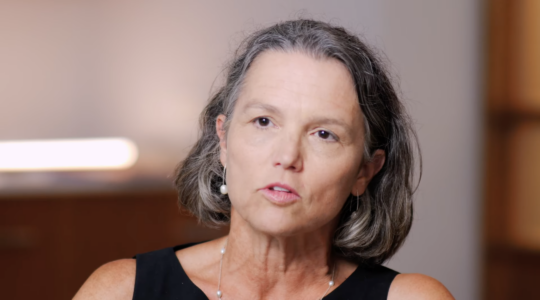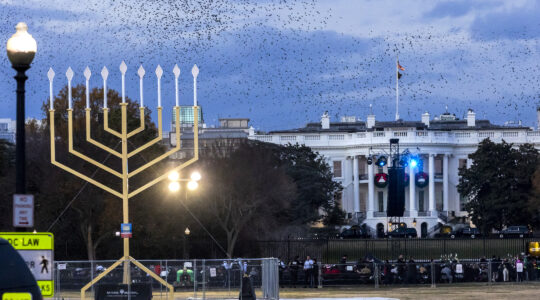
Republican presidential candidates, from left, former Pennsylvania Sen. Rick Santorum, former New York Gov. George Pataki, Sen. Rand Paul, R-Ky., former Arkansas Gov. Mike Huckabee, Sen. Marco Rubio, R-Fla., Sen. Ted Cruz, R-Texas, retired neurosurgeon Ben Carson, businessman Donald Trump, former Florida Gov. Jeb Bush, Wisconsin Gov. Scott Walker, businesswoman Carly Fiorina, Ohio Gov. John Kasich, and New Jersey Gov. Chris Christie take the stage during the CNN Republican presidential debate at the Ronald Reagan Presidential Library and Museum on Wednesday, Sept. 16, 2015, in Simi Valley, Calif. (Chris Carlson/AP Images)
WASHINGTON (JTA) — Candidates in a Republican presidential debate were divided over whether to honor the Iran nuclear deal.
The question of whether or not to abandon the deal drew unusually sharp divisions in the CNN debate on Wednesday evening at the Ronald Reagan Presidential Library and Museum in Simi Valley, California. The sanctions relief for nuclear restrictions deal reached in July between six major powers and Iran has been described as President Barack Obama’s signature foreign policy achievement.
Of the 15 candidates, seven said they would kill the deal and three said they would abide by it. Two said they would make demands that would effectively quash the agreement and one urged Congress to stop it while there was time. Two candidates did not directly address how they would treat the deal.
Billionaire businessman Donald Trump, the front-runner in polls, called the Iran deal “one of the worst contracts of any kind I’ve ever seen,” but did not say whether he would kill it.
The exchange among the 11 candidates in the second round, which featured those with the most support in polls, was launched when moderator Jake Tapper asked Sen. Ted Cruz, R-Texas, to react to published comments by Ohio Gov. John Kasich deriding a pledge by Cruz to rip up the deal.
“This deal abandons four American hostages in Iran, and this deal will only accelerate Iran’s acquiring nuclear weapons,” Cruz said. “You’d better believe it. If I am elected president, on the very first day in office, I will rip to shreds this catastrophic Iranian nuclear deal.”
Cruz pivoted to an attack on Kasich.
“If there’s anyone up here who would be bound by this catastrophic deal with Iran, they’re giving up the core responsibility of commander in chief and as president. I would never do that,” Cruz said.
Kasich responded that he agreed the deal was a “bad” one, but said it was better to work with the allies who helped negotiate it.
“If we find out that they may be developing a nuclear weapon, then the military option is on the table,” he said. “We are stronger when we work with the Western civilization, our friends in Europe, and just doing it on our own I don’t think is the right policy.”
Sen. Rand Paul, R-Ky., agreed with Kasich, calling Cruz’s proposal “absurd.”
Candidates seemed eager to weigh in one way or the other. Asked about his China policy, Wisconsin Gov. Scott Walker added, “I was one of the first ones to call for terminating the bad deal with Iran on day one.”
Former Florida Gov. Jeb Bush rejoined to Walker that “as it relates to Iran, it’s not a strategy to tear up an agreement.”
Instead, Bush said, “The first thing that we need to do is to establish our commitment to Israel which has been altered by this administration. And, make sure that they have the most sophisticated weapons to send a signal to Iran that we have Israel’s back.”
Former Arkansas Gov. Mike Huckabee also insisted on interjecting his view, saying that “we must, simply, make it very clear that the next president, one of us on this stage, will absolutely not honor that agreement, and will destroy it and will be tough with Iran, because otherwise we put every person in this world in a very dangerous place.”
Sen. Marco Rubio, R-Fla., derided those “who said we should trust this Iranian deal, see if the Iranians will comply.” Referring to the Iranian supreme leader, Ayatollah Ali Khamenei, Rubio said, “Anyone who is paying attention to what Khamenei says knows that they will not comply.”
Former Hewlett-Packard CEO Carly Fiorina inserted her answer into a question about whether to fund Planned Parenthood, which was involved recently in an abortion controversy.
She said that on her first day in office, she would first call Israeli Prime Minister Benjamin Netanyahu to assure him “we will stand with the state of Israel” and then Khamenei “to tell him that unless and until he opens every military and every nuclear facility to real anytime, anywhere inspections by our people, not his, we, the United States of America, will make it as difficult as possible [to] move money around the global financial system.”
Fiorina did not directly say she would abrogate the agreement, but threatened sanctions unless Khamenei allows in American inspectors with unfettered access. Fiorina’s demands would effectively quash the deal.
New Jersey Gov. Chris Christie in his closing remarks said, “I will not agree to anything with a country that says death to us and death to Israel and holds our hostages while we sign agreements with them.”
Among the 11 candidates in the second round, only Ben Carson, a physician, did not say how he would approach the deal.
Christie was among four candidates who included a reference to Israel in his closing remarks; the others were Cruz, Rubio and Huckabee. Cruz said one of his first acts would be to move the U.S. Embassy in Tel Aviv to Jerusalem.
Kasich quoted in his closing remarks from a Holocaust memorial on the statehouse grounds: “If you’ve saved one life, you’ve changed the world.”
Of the four candidates who participated in an earlier debate for candidates who were polling poorly, two – Sen. Lindsey Graham, R-S.C., and former New York Gov. George Pataki – said they would abrogate the deal. Former Sen. Rick Santorum, R-Pa., stipulated the same conditions as Fiorina, which would effectively kill the deal. Louisiana Gov. Bobby Jindal called on Congress to seek avenues to kill the deal.
JTA has documented Jewish history in real-time for over a century. Keep our journalism strong by joining us in supporting independent, award-winning reporting.





